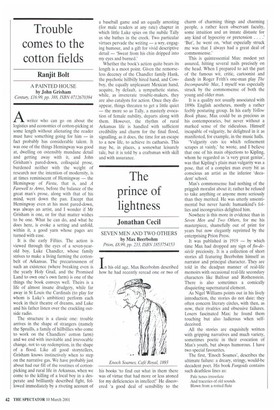Trouble comes to the cotton fields
Ranjit Bolt
A PAINTED HOUSE by John Grisham
Centwy, £16.99, pp. 388, ISBN 0712670394
Awriter who can go on about the logistics and economics of cotton-picking at some length without alienating the reader must have something going for him — in fact probably has considerable talent. It was one of the things Hemingway was good at, dwelling on ostensibly mundane detail and getting away with it, and John Grisham's pared-down, colloquial prose, burdened neither with the weight of research nor the intention of modernity, is at times reminiscent of Hemingway — the Hemingway of Fiesta, that is, and A Farewell to Arms, before the balance of the great man's prose, along with that of his mind, went down the pan. Except that Hemingway even at his most pared-down, was always an artist, and I wonder if Mr Grisham is one, or for that matter wishes to be one. What he can do, and what he does here, is evoke a setting and unfold, within it, a good yarn whose pages are turned with ease.
It is the early Fifties. The action is viewed through the eyes of a seven-yearold boy, Luke Chandler, whose family Strives to make a living farming the cottonbelt of Arkansas. The precariousness of such an existence (where breaking even is the yearly Holy Grail, and the Promised Land to own one's own farm) is one of the things the book conveys well. Theirs is a life of almost insane drudgery, while far away in St Louis the Cardinals (to play for whom is Luke's ambition) perform each week in their theatre of dreams, and Luke and his father listen over the crackling outside radio.
The structure is a classic one: trouble arrives in the shape of strangers (namely the Spruills, a family of hillbillies who come to work on the Chandlers' cotton farm) and we end with inevitable and irrevocable change, not to say redemption, in the shape of a flood. Like all good storytellers, Grisham knows instinctively when to step on the narrative gas. We have probably just about had our fill of the routines of cotton picking and rural life in Arkansas, when we come to the killing of a local boy in a desperate and brilliantly described fight, followed immediately by a riveting account of a baseball game and an equally arresting (for male readers at any rate) chapter in which little Luke spies on the nubile Tally as she bathes in the creek. Two particular virtues pervade the writing — a wry, engaging humour, and a gift for vivid descriptive detail — 'Sweat from his chin dripped into my eyes and burned.'
Whether the book's action quite bears its length is a moot point. Given the remorseless decency of the Chandler family Hank, the psychotic hillbilly hired hand, and Cowboy, the equally unpleasant Mexican hand, acquire, by default, a sympathetic status, while, as inveterate trouble-makers, they are also catalysts for action. Once they disappear, things threaten to get a little quiet — the more so as Tally, a masterly evocation of female nubility, departs along with them. However, the rhythm of rural Arkansas life is handled with sufficient credibility and charm for the final flood, signalling, as it does, the time for an escape to a new life, to achieve its catharsis. This may be, in places, a somewhat leisurely tale, but it is told by a craftsman with skill and with assurance.


































































 Previous page
Previous page